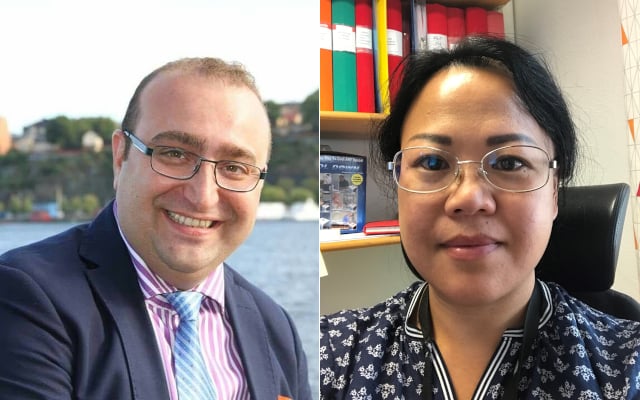OPINION: Sweden's new migration act will send international talent elsewhere

Sweden's new migration act imposes tough conditions for permanent residency. Jenny Iao-Jörgensen and Benny Borghei of the Swedish Association of University Teachers and Researchers (SULF) argue this will do long-term damage to the country's attractiveness to the top international talents.
The Aliens Act brought amendments to the Swedish migration requirements for obtaining a permanent residence permit (permanent uppehållstillstånd – PUT).
The new requirements that came into force on July 20th, 2021, severely affect foreign doctoral candidates and researchers in Sweden. It wastes several years of tax-funded investments in research by expelling thousands of foreign PhD graduates and researchers from the country.
Furthermore, it hampers Sweden’s research and development attractiveness and impedes the scientific excellence brought by international talents to the country.
The new requirements for permanent residence permits stipulate that the applicants provide proof of permanent or fixed-term employment contracts lasting at least 18 months from the date on which their applications will be examined, or in some cases show the proof of trial employment or other means of support.
Unemployment insurance benefits are not counted as qualifying financial support, and the application for permanent residency can only be made 14 days before the current permit expires. There is no transition time; hence those who applied before July 20th are also subject to the new requirements at very short notice.
Many of our members at SULF Doctoral Candidates' Association expressed their deepest concerns about these requirements, which completely overlook the generally vulnerable nature of doctoral employment conditions, making it practically impossible for anyone from outside EU/EEA to fulfil the stringent conditions. Hence, we draw the attention to the following issues that place our members in an extremely unfavourable situation:
- Researchers and doctoral candidates’ employment contracts are short, fixed-term and often extended annually. In many cases, contracts may get even shorter, sometimes three-to-six months at a time.
- Doctoral candidates cannot change job due to the temporary residency permits issued specifically for doctoral employment. Hence, they get caught in a circular deadlock where their temporary residency permit does not allow for changing of employment-type, while their permanent residence permit depends on the proof of long-term or permanent employment.
- Doctoral candidates experience the most stressful situation near graduation. They may still be teaching and must publish articles and write a doctoral dissertation while preparing for final defence of their doctoral degree. It is during this time that they have to find a long-term or permanent employment to fulfil the new requirements for permanent residency permit; otherwise, they would run the risk of being expelled from Sweden as their temporary residence permit expires.
- A majority of them have already spent several years of continued residency in Sweden, made special ties with the Swedish academic system and the public society. Many of them have families and children born in Sweden and have lived in Sweden for many years, contributing to Swedish society in different ways. Many accepted the job in Sweden based on previous legislation grounds that allowed permanent residency after four years. The prospect of being expelled from the country with these new requirements completely break those social contracts.
According to the Swedish Higher-Education Authority (UKÄ), 37 percent of the total 17,000 doctoral candidates registered in 2020 are from foreign countries; of whom six-in-ten leave Sweden after graduation.
Other reports suggested 66 percent of the non-EU/EEA researchers previously eligible for Swedish permanent residency are considering leaving Sweden. Now, with the tightening requirements in force, further numbers will have to leave or will be deterred from accepting doctoral or research employment due to the gloomy residency regulations in Sweden.
These changes stand at odds with the ambitions for internationalisation of higher-education and scientific advancements, hampering Sweden’s reputation and aspirations as an attractive place for global talents. Sweden has made significant investments in research and education in recent years, but the tightening requirements for permanent residency permits would make other countries reap the benefits of those public investments.
Since the 2014 landmark legislation granting doctoral candidates permanent residency, we observed great advances in attracting talents from other countries, but the new requirements set back those advancements, adding another layer of vulnerability to thousands of researchers and their family members in Sweden.
We demand that politicians, the Ministry of Justice, the Ministry of Education and the Migration Agency take immediate action to mitigate the insecurities implied by the Aliens Act. They need to work together to ensure that the implementation of the Aliens Act does not play against Swedish public interests. Meanwhile, we inform respective university staff about the aforementioned challenges and call for their consideration and support to the foreign doctoral candidates and researchers affected by those extreme requirements inflicted by the Aliens Act.
Jenny Iao-Jörgensen is chair of the Swedish Association of University Teachers and Researchers – Doctoral Candidates Association (SULF-DCA). Benny Borghei is member of the Nomination Committee and a former board member at SULF-DCA.

Benny Borghei and Jenny Iao-Jörgensen. Photos: Private
Comments (6)
See Also
The Aliens Act brought amendments to the Swedish migration requirements for obtaining a permanent residence permit (permanent uppehållstillstånd – PUT).
The new requirements that came into force on July 20th, 2021, severely affect foreign doctoral candidates and researchers in Sweden. It wastes several years of tax-funded investments in research by expelling thousands of foreign PhD graduates and researchers from the country.
Furthermore, it hampers Sweden’s research and development attractiveness and impedes the scientific excellence brought by international talents to the country.
The new requirements for permanent residence permits stipulate that the applicants provide proof of permanent or fixed-term employment contracts lasting at least 18 months from the date on which their applications will be examined, or in some cases show the proof of trial employment or other means of support.
Unemployment insurance benefits are not counted as qualifying financial support, and the application for permanent residency can only be made 14 days before the current permit expires. There is no transition time; hence those who applied before July 20th are also subject to the new requirements at very short notice.
Many of our members at SULF Doctoral Candidates' Association expressed their deepest concerns about these requirements, which completely overlook the generally vulnerable nature of doctoral employment conditions, making it practically impossible for anyone from outside EU/EEA to fulfil the stringent conditions. Hence, we draw the attention to the following issues that place our members in an extremely unfavourable situation:
- Researchers and doctoral candidates’ employment contracts are short, fixed-term and often extended annually. In many cases, contracts may get even shorter, sometimes three-to-six months at a time.
- Doctoral candidates cannot change job due to the temporary residency permits issued specifically for doctoral employment. Hence, they get caught in a circular deadlock where their temporary residency permit does not allow for changing of employment-type, while their permanent residence permit depends on the proof of long-term or permanent employment.
- Doctoral candidates experience the most stressful situation near graduation. They may still be teaching and must publish articles and write a doctoral dissertation while preparing for final defence of their doctoral degree. It is during this time that they have to find a long-term or permanent employment to fulfil the new requirements for permanent residency permit; otherwise, they would run the risk of being expelled from Sweden as their temporary residence permit expires.
- A majority of them have already spent several years of continued residency in Sweden, made special ties with the Swedish academic system and the public society. Many of them have families and children born in Sweden and have lived in Sweden for many years, contributing to Swedish society in different ways. Many accepted the job in Sweden based on previous legislation grounds that allowed permanent residency after four years. The prospect of being expelled from the country with these new requirements completely break those social contracts.
According to the Swedish Higher-Education Authority (UKÄ), 37 percent of the total 17,000 doctoral candidates registered in 2020 are from foreign countries; of whom six-in-ten leave Sweden after graduation.
Other reports suggested 66 percent of the non-EU/EEA researchers previously eligible for Swedish permanent residency are considering leaving Sweden. Now, with the tightening requirements in force, further numbers will have to leave or will be deterred from accepting doctoral or research employment due to the gloomy residency regulations in Sweden.
These changes stand at odds with the ambitions for internationalisation of higher-education and scientific advancements, hampering Sweden’s reputation and aspirations as an attractive place for global talents. Sweden has made significant investments in research and education in recent years, but the tightening requirements for permanent residency permits would make other countries reap the benefits of those public investments.
Since the 2014 landmark legislation granting doctoral candidates permanent residency, we observed great advances in attracting talents from other countries, but the new requirements set back those advancements, adding another layer of vulnerability to thousands of researchers and their family members in Sweden.
We demand that politicians, the Ministry of Justice, the Ministry of Education and the Migration Agency take immediate action to mitigate the insecurities implied by the Aliens Act. They need to work together to ensure that the implementation of the Aliens Act does not play against Swedish public interests. Meanwhile, we inform respective university staff about the aforementioned challenges and call for their consideration and support to the foreign doctoral candidates and researchers affected by those extreme requirements inflicted by the Aliens Act.
Jenny Iao-Jörgensen is chair of the Swedish Association of University Teachers and Researchers – Doctoral Candidates Association (SULF-DCA). Benny Borghei is member of the Nomination Committee and a former board member at SULF-DCA.

Join the conversation in our comments section below. Share your own views and experience and if you have a question or suggestion for our journalists then email us at [email protected].
Please keep comments civil, constructive and on topic – and make sure to read our terms of use before getting involved.
Please log in here to leave a comment.